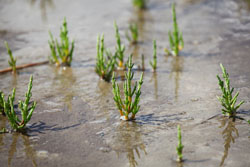Cost-effective biofilter for aquaculture wastewater
Salicornia is a humble weed that thrives next to the sea thanks to its affinity for salt water. In fact, although it is not systematically cultivated, one of its common names is pickleweed since many cultures harvest, pickle and eat Salicornia. This could change as researchers have found that constructed wetlands (CWs) can readily convert wastewater from fish farms into valuable biomass in the form of Salicornia. Funding for the project 'Improvement of the cost effectiveness of marine land based aquaculture facilities through use of constructed wetlands with Salicornia' (Envirophyte) was provided in part by the EU. Prototype CWs were established at warm, temperate and cold water sites and supplied with wastewater from land-based hatcheries and fish farms. The best results were obtained in warm and cold conditions with more than 90 % pollutant removal. The Envirophyte team also invested considerable effort into maximising Salicornia production. The quality of the harvest was closely scrutinised in collaboration with prospective customers. In addition to the food industry, Salicornia also has vast potential for exploitation in the cosmetics industry and future research should target this aspect. The combination of effective wastewater treatment with additional income from Salicornia sales makes for a very attractive solution for land-based fish farmers.







